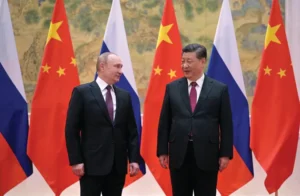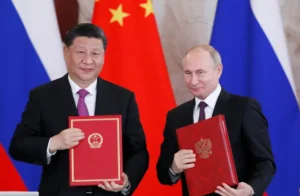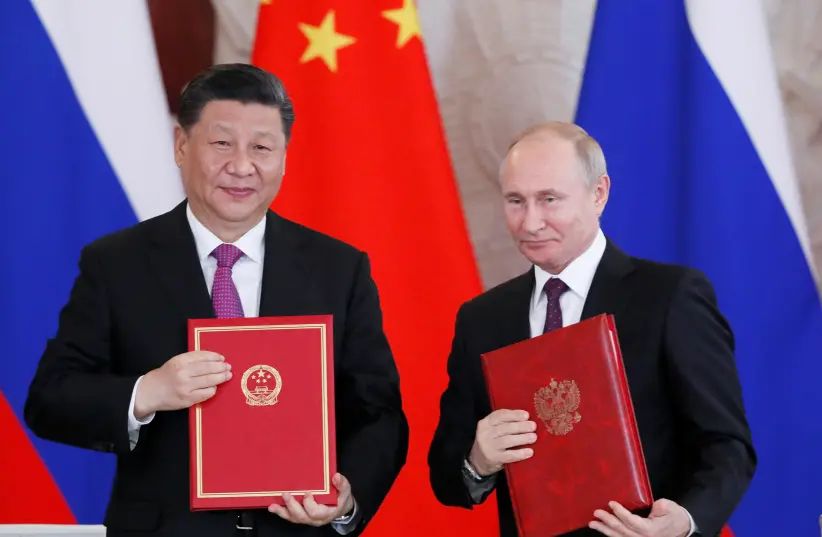INTERNATIONAL AFFAIRS: What China has seen in Ukraine has definitely affected its decision-making regarding Taiwan and the possible response it could expect.

The way that China is approaching the Russian invasion of Ukraine is not that far from how it approaches relations with Israel and other Middle Eastern countries. It always picks the same side, and that side is China itself.
Yet China seems to eat its cake and have it, too, maintaining strong ties with opposing sides.
China could on one hand have strong economic ties with Israel, developing mutual scientific and academic initiatives, and even directly investing, especially in the hi-tech sector. On the other hand, China has robust dealings with the rest of the Middle East, some of which, like Iran, is completely opposed to Israel. This raises the question of what side it is on.
That question is also relevant in relation to Russia and Ukraine. Even in relation to Taiwan, China is taking careful notes on how the conflict is evolving.
China’s approach to the Russia-Ukraine war has been somewhat unclear since the conflict began. On one hand, it refuses to support the Western sanctions against Russia and even boasts of the two countries’ economic ties. On the other, it does not actively support Russia.

China has made efforts to remain as neutral as it can in the international playground, trying to play for both teams. Its refusal to sanction Russia officially or support Ukraine may seem like China is in silent support of Russia, but its reasoning for doing so is very different.
“China cares most about one thing – China.”
Prof. Yuri Pines
“China cares most about one thing – China,” Prof. Yuri Pines, head of the Hebrew University’s Asia studies division and a leading expert on China, said in an interview with The Jerusalem Post.
While there was some support for Russia’s actions at the beginning of the conflict, China quickly saw that Russia was failing. Not only that, Russia was hammered by economic sanctions that could spill over to China if it did show support, something that, in China’s eyes, would simply hurt it, especially since China didn’t have much to gain from the conflict.
“China doesn’t see Russia as an ally or friendly neighbor; they see them as a client.”
Prof. Danny Orbach
“China doesn’t see Russia as an ally or friendly neighbor; they see them as a client,” Prof. Danny Orbach of the Hebrew University said in an interview with the Post.
“If furthering support for Russia would hurt China more than it would benefit it, there was simply no reason to do so,” he added.
Over time, one could even see a slow, silent distancing of China from Russia. While no official sanctions were declared by the ruling party, several private companies, such as Chinese drone maker DJI Technology Co., have withdrawn their operations from the country entirely, a move that the government certainly had a hand in.
This slow distancing is more complex than simple cost-benefit analysis, however. In the Chinese way of thinking, losers are not looked upon favorably.
BACK IN China’s dynastic days, an emperor was given the “mandate of heaven” to rule over the central kingdom, and if one day that leader were to falter, it would come to show that he did not deserve the mandate to begin with. Similarly, Russia’s continued loss, coupled with increased cooperation by Western countries in response, made Russia a player not worth supporting, even if the support was not robust to begin with.
Beyond the swaying approach of the ruling party itself, there have been voices that went against any support of Russia to begin with. Those, however, were not cemented in a true belief in any side but were more of an expression of internal Chinese criticism.
Scholars in China, according to Pines, have been opposing Chinese support of Russia, not because of an inherent opposition to Russia’s actions or support for the Ukrainian people’s struggles, but as direct opposition to the Chinese government itself.
“The criticism they voiced was intended as against the ruling party, an expression of an internal conflict as opposed to an external one,” Pines added.
Even in the eyes of factions opposed to the rule of the Communist Party, the Chinese focus on themselves first remains the same.
The painting of Russia as an unworthy loser through the eyes of Chinese philosophy, coupled with the real threat of economic and diplomatic loss, is enough on its own to drive the two countries apart.
We will likely see further distancing between Russia and China over time, Pines explained, although China most likely won’t take any drastic steps to oppose Russia in the future, simply because it has nothing to gain from that.
The reasoning behind China not taking further steps against Russia in the manner of most of the West has less to do with Russia and Ukraine and more to do with the growing rivalry between China and the West, particularly the United States.
Only recently, US Secretary of State Antony Blinken announced that the country’s approach to East Asia and China in particular would be “centered around China’s increasingly aggressive and expansive authoritarian one-party state.”
President Joe Biden said that the United States would intervene militarily if China attempts to take Taiwan by force, a warning that appeared to deviate from the deliberate ambiguity traditionally held by Washington, according to CNN.
During a joint news conference with Japanese Prime Minister Fumio Kishida in Tokyo, Biden was asked if the US would be willing to go further to help Taiwan in the event of an invasion than it did with Ukraine.
“You didn’t want to get involved in the Ukraine conflict militarily for obvious reasons. Are you willing to get involved militarily to defend Taiwan, if it comes to that?” a reporter asked.
“Yes,” Biden replied. “That’s the commitment we made.
“We agree with the One China policy. We signed on to it, and all the attendant agreements made from there, but the idea that it can be taken by force, just taken by force, is [just not] appropriate,” he said.
The rising tensions created, quite understandably, the tension between the two blocs and pitted China against the US. Under those circumstances, China wouldn’t want to cooperate with the same players that have been butting heads with it.
China’s lack of cooperation with the West has a lot less to do with Ukraine or Russia, and a lot more to do with this broader silent conflict China has with those supporting Ukraine. China has, in fact, invested enormously in Ukraine and its industries, all of which went down the drain, causing massive financial loss.
China and Taiwan
While one could draw parallels between what is happening in Ukraine and what China might do in Taiwan, the two scenarios are very different, even if they may not seem like it at first glance.
Unlike Russia’s views on the “independence” of east Ukrainian regions, China thinks of Taiwan as a part of itself. The narrative Russia is pushing, Orbach explained, is even viewed as problematic for China’s ruling party, as it promotes sovereignty for breakaway regions that seek independence, something that raises issues in some territories in China, especially Taiwan.
Another key difference is that China wants to avoid a military conflict with Taiwan as much as it can. If anything, the destruction brought upon Ukraine and its population, coupled with devastating sanctions, only strengthens this point.
“If China were to attack Taiwan, the damage done to it would be devastating,” Orbach explained. “China’s purpose with Taiwan is to integrate it into greater China and to gain economically from it. They can’t do that with destroyed infrastructure and major civilian casualties.”
“China’s purpose with Taiwan is to integrate it into greater China and to gain economically from it. They can’t do that with destroyed infrastructure and major civilian casualties.”
Prof. Danny Orbach
China’s main concern, once again, is China. Reining in Taiwan could bring a bustling, advanced economy and industry as well as advanced infrastructure and an educated population into the fold. An outright assault would render all of these meaningless.
Economic concerns are not the only issue bothering the Communist Party. China itself is composed of many different populations that comprise greater China. To maintain control of areas such as Tibet and Hong Kong, China needs to project enough force to cement this union.
Even with Taiwan, China has its redlines.
The current status quo China has with Taiwan may be inconvenient to them, but it is tolerable. Taiwan may not be swept into the fold like China would like, but at least it is not claiming independence, at least not yet.
Such a move not only would go against China’s policies but would also signal a very clear message to other entities that wish to decide their own future – the message that independence from China is possible.
In a harsh contrast to what Russia is claiming in eastern Ukraine, China will not tolerate an attempt of regions to break away from it, and at this point, even China will go against economic benefit from fear that such an action from Taiwan would cascade, causing its whole system to crumble.
China will fight at all costs any efforts to make Taiwan independent, Defense Minister Gen. Wei Fenghe has warned, setting out Beijing’s vision for regional order in a speech at the Shangri-La summit.
While Beijing also said it is trying its best to “peacefully reunify” the self-ruled island with the mainland, Wei said China’s only option is to fight to the very end when independence is pursued.
“We will fight at all costs, and we will fight to the very end,” Wei said. “This is the only choice for China.”
Although the difference in force between mainland China and Taiwan is staggering, it would by no means be an easy campaign for China.
Taiwan and its military have been preparing for such an assault for many years. While high-ranking Taiwanese military officials told Pines that they are quite aware they would not win a war with China, they most defiantly intend to make such a scenario as difficult as they can.
Geographically, Taiwan has a limited number of beaches suitable for troop landing and a clear line of sight toward mainland China. While vastly outnumbered, Taiwan has a substantial defensive advantage, Orbach explained.
Although China would, eventually, manage to overcome Taiwan, it would do so at an immense price. Taiwan is using the threat of such a hard blow to deter China from engaging with it in the first place.
Tensions across the Taiwan Strait are one of the top security concerns for the United States and its allies in the Indo-Pacific. Taiwan is a key US strategic partner in the region.
In case of a full-blown war, Taiwan hopes that the US would respect the Taiwan Relations Act, which states that “the United States will make available to Taiwan such defense articles and defense services in such quantity as may be necessary to enable Taiwan to maintain sufficient self-defense capabilities.”
Although the agreement purposely avoids stating the US would interfere directly, Orbach is sure it would do so, but in a limited capacity.
If the conflict were to escalate, the US, apart from supplying necessary equipment, would likely strike military facilities in China itself, as well as naval task forces.
Such a scenario could be devastating to all involved, and Orbach speculated that if it were to escalate that far, there is a real possibility China would use nuclear weapons.
Putin has been brandishing his nuclear arsenal to the world ever since the invasion of Ukraine, although, realistically, the chances of Russia actually using such weapons in Ukraine are incredibly low. Whatever weapon Russia may use in Ukraine, the leap from that to nuclear weapons is immense. It would harm not only military targets but civilian ones, too, as well as the land and the civilians themselves.
China has a midway point that would make that leap a bit shorter. If the US would get directly involved in the conflict, China could target the US’s naval task forces out at sea with nuclear weapons. In such a case, the only targets would be military, with no civilian casualties or damage done; even land and infrastructure would be safe from the atomic blast.
These predictions are bleak but require severe escalation from all sides. While the current status quo remains stable, such a scenario is unlikely.
What China has seen in Ukraine has definitely affected its decision-making regarding Taiwan and the possible response it could expect. The initial support for Russia is growing weaker over time.
China still needs to make a show of force in order to keep all of the moving cogs of greater China working properly. One can only hope that it is only a show, and nothing more. •

